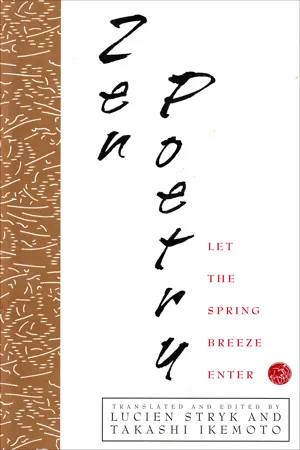
- 124 pages
- English
- ePUB (mobile friendly)
- Available on iOS & Android
About This Book
From the editors of Zen Poems of China and Japan comes the largest and most comprehensive collection of its kind to appear in English. This collaboration between a Japanese scholar and an American poet has rendered translations both precise and sublime, and their selections, which span fifteen hundred years—from the early T'ang dynasty to the present day—include many poems that have never before been translated into English. Stryk and Ikemoto offer us Zen poetry in all its diversity: Chinese poems of enlightenment and death, poems of the Japanese masters, many haiku—the quintessential Zen art—and an impressive selection of poems by Shinkichi Takahashi, Japan's greatest contemporary Zen poet. With Zen Poetry, Lucien Stryk and Takashi Ikemoto have graced us with a compellingly beautiful collection, which in their translations is pure literary pleasure, illuminating the world vision to which these poems give permanent expression.
Frequently asked questions
Information
Part One
Chinese Poems of Enlightenment and Death
Enlightenment
I’m robed and shaven clean.
You ask why Bodhidharma came east—
Staff thrust out, I hum like mad.
Footing east, west.
Back in Seiken,
I’ve not moved an inch.
Have a good laugh.
Shaven, you’re handsomer—
Those useless eyebrows!
And blew from his palm,
Revealing the Source itself.
Look where clouds hide the peak.
The torrent—his preaching.
Last night, eighty-four thousand poems.
How, how make them understand?
At its tip long ropes of cloud.
Since I smashed the mud-bull’s horns,
The stream’s flowed backwards.
Nobody’s grasped its roots.
Turned from sweet plum trees,
They pick sour pears on the hill.
Plums—from where?
Once he saw them, Reiun
Danced all the way to Sandai.
Handed down, yet lost in leafy branch
They miss the root. Disciple Kaku shouts—
“Joshu never said a thing!”
What’s old? new?
At home on my blue mountain,
I want for nothing.
At its source the river’s cold.
If you would see,
Climb the mountain top.
I’ve scorned those seeking
Truth outside themselves:
Here, on the tip of the nose.
Now the old mirror
Reflects everything—autumn light
Moistened by faint mist.
Blue peaks ring Five Phoenix Tower.
In late spring light I throw this body
Off—fox leaps into the lion’s den.
A call: how deep, how ordinary.
Seeking what I’d lost,
I found a host of saints.
In fighting, kill.
Tokusan, Ganto—
A million-mile bar!
Vainly questioning masters.
A herald cries, “He’s coming!”
Liver, gall burst wide.
Touched, it glitters.
Why spread such nets
For sparrows?
I ran barefoot east and west.
Now more lucid than the moon,
The eighty-four thousand
Dharma gates!
Take it up—exhaustless.
Once lit,
A sister is a sister.
A pair of mandarin ducks
Alighting, bobbing, anywhere.
Yet what’s there
To cling to? Last night,
Turning, I was blinded
By a ray of light.
A thief escaped
My body. What
Have I learnt?
The Lord of Nothingness
Has a dark face.
All living things bend low.
Mount Sumeru dances
All the way to Sandai.
Dozing this morn in Lord Sunyata’s
Palace, I heard the warbler.
Spring breeze shakes loose
The blossoms of the peach.
Bones of the Void are scattered.
Why should the golden lion
Seek out the fox’s lair?
Snowflakes melt in air.
How could I have doubted?
Where’s north? south? east? west?
In spring blossom everywhere.
Now insight’s mine,
Another dust-speck in the eye!
All things beg for life.
Even the half-dead snake
Stuffed in the basket.
Giving to haves, taking from
Have-nots—never enough.
My strength.
One night I bent
My pointing finger—
Never such a moon!
Death
Its golden chain, moon-...
Table of contents
- Cover page
- Title Page
- Copyright Page
- Dedication
- Acknowledgements
- Contents
- Preface
- Introduction
- A Note on the Translation
- Part One Chinese poems of Englightenment and Death
- Part Two Poems of the Japanese Zen Masters
- Part Three Japanese Haiku
- Part Four Shinkichi Takahashi, Contemporary Japanese Master
- Afterword Death of a Zen Poet: Shinkichi Takahashi